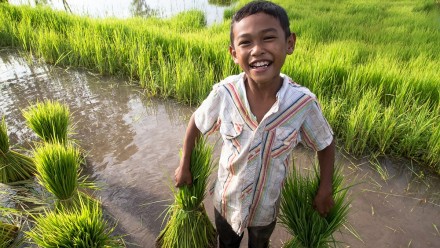The Resilience Initiative for Food and Agriculture (RIFA)
The world is facing an increasingly disrupted food future due to significant global challenges such as climate change and the COVID-19 pandemic. In the Asia-Pacific, governments struggle to alleviate hunger for hundreds of millions in the region, as recent shocks such as emerging pests and disease have exacerbated disruptions to the region’s food systems.
In the wake of this emerging crisis, The Australian National University (ANU), The Commonwealth Scientific and Industrial Research Organisation (CSIRO), and the Department of Foreign Affairs and Trade (DFAT) have launched the Resilience Initiative for Food and Agriculture (RIFA). The initiative brings together interdisciplinary agri-food expertise from Australia and the Asia-Pacific to deliver science-backed and development-ready solutions shaped by local contexts.
Collaborative success leads to RIFA
In 2020, ANU and CSIRO undertook research seeking to understand the impact of COVID-19 on food security in the Asia-Pacific region.
“The success of our collaboration served as the catalyst for the development of a broader research initiative,” said Dr Steven Crimp, who is a Research Fellow at the ANU Institute for Climate, Energy and Disaster Solutions (ICEDS) and the ANU Initiative Co-ordinator for RIFA.
“The new initiative – RIFA – focuses on improving the resilience of Asia-Pacific agri-food systems to both anthropogenic and environmental shocks,” he said.
RIFA is an “ideas incubator”
RIFA aims to build resilience capacity in Asia-Pacific agri-food systems by acting as an “ideas incubator” for food security solutions, delivering research, development, teaching, information-sharing and investment to the region.
The project also aims to build a pipeline of talent and support a new generation of agri-food leaders in academia, government and the private sector through postdoctoral research fellowships, short courses, internships, project partnerships and other activities.
RIFA Research project 1: Scoping study
A first step for RIFA was to conduct a scoping study which looked specifically at development projects and research studies that dealt with resilience in some aspect of the food system.
Completed in 2021, the synthesis identified the current focal areas of food systems resilience research across the Indo-Pacific region, but more importantly highlighted critical gaps where new research and action are required to establish or improve resilience. Some examples include developing further knowledge to understand the dynamics of rural and urban migration as a response to external shocks or drivers, examining the use of a “One Health” framing to improve food systems resilience, and understanding the cascading impacts of multiple shocks or drivers on food systems.
“There is also room to improve the integration of gender equity and traditional knowledge as precursors to resilience, along understanding how we can introduce positive feedback loops in our food supply chains to make them more resilient to disruptions,” said Dr Crimp.
RIFA Research project 2: Rapid Response and Situational Analysis Dashboard
A second research project initiated by RIFA in 2021 was the Rapid Response and Situational Analysis Dashboard.
Significant drivers are shaping our views on food system vulnerabilities, including increasing demand for food, plateauing productivity, changing frequency of extreme events, changes in pest, weed and disease prevalence and system shocks like COVID 19 and climate change.
"In order to understand how food stress events may unfold we need to be able to track a range of precursors,” said Dr Crimp. “This project allows us to consider a range of possible food stress precursors and track them in near-real time by developing a data ingestion and analysis package.”
Dr Crimp explains that data from the project will allow governments to target resources to ensure recovery from stress events. Ongoing real-time collection of information from a range of sources will also allow the effectiveness of interventions to be measured.
“Over time, this system could also be extended to the collection of other information related to food production, sovereignty and quality,” he said.
Several international aid agencies have shown a significant amount of interest in the Dashboard project, as a tool to support the development of response strategies to food stress events.
What’s next for RIFA?
The RIFA partnership has also provided a template for ANU and CSIRO to explore other key research partnerships, such as the current $5.5 Million Science and Technology for Climate Program (SciTech4Climate) funded by the Department of Foreign Affairs and Trade (DFAT).
For more information and important updates, visit the RIFA website.











